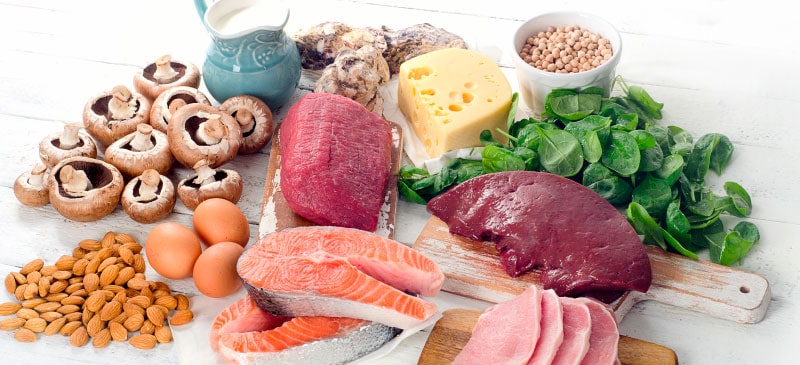Health Benefits of Vitamin B2 (Riboflavin)
What are the health benefits of B2 (Riboflavin)?
Riboflavin, also known as vitamin B2, is a water-soluble vitamin that is essential for various bodily functions. Here are some of the health benefits associated with riboflavin:
- Energy Production: Riboflavin plays a key role in the metabolism of fats, carbohydrates, and proteins, helping the body convert these nutrients into energy.
- Antioxidant Activity: Riboflavin acts as an antioxidant, helping to protect cells from damage caused by free radicals. It also helps in the regeneration of other antioxidants such as glutathione, vitamin C, and vitamin E.
- Skin and Eye Health: Riboflavin is important for maintaining healthy skin, eyes, and mucous membranes. It is involved in the production of collagen, which is essential for skin health, and it supports normal vision.
- Nervous System Function: Riboflavin is important for the proper functioning of the nervous system. It is involved in the production of neurotransmitters and helps maintain the myelin sheath, which insulates and protects nerves.
- Red Blood Cell Production: Riboflavin is involved in the production of red blood cells, which are responsible for carrying oxygen throughout the body.
- Migraine Prevention: Some studies suggest that riboflavin supplementation may help reduce the frequency and severity of migraines, although more research is needed in this area.
- Cancer Prevention: Some research suggests that riboflavin, along with other B vitamins, may play a role in reducing the risk of certain cancers, although more studies are needed to confirm these findings.
- Healthy Growth and Development: Riboflavin is important for healthy growth and development, especially in children and adolescents.
- Thyroid Function: Riboflavin is necessary for the activation of vitamin B6 and folate, which are important for normal thyroid function.
- Metabolism of Other Nutrients: Riboflavin is necessary for the activation of vitamin B6 and folate, which are important for normal thyroid function.
Riboflavin is found in various foods, including dairy products, eggs, lean meats, green leafy vegetables, and nuts. Most people can get an adequate amount of riboflavin through their diet, but supplementation may be necessary for certain individuals, such as pregnant or breastfeeding women, vegetarians, and people with certain medical conditions.
What are the health risks of B2 (Riboflavin)?
Riboflavin, or vitamin B2, is generally considered safe when consumed in recommended amounts, as it is a water-soluble vitamin that is excreted in the urine and does not accumulate in the body. However, there are a few potential health risks associated with riboflavin:
- Allergic Reactions: Some people may be allergic to riboflavin supplements, which can cause symptoms such as itching, hives, or difficulty breathing.
- Gastrointestinal Issues: In some cases, high doses of riboflavin supplements can cause digestive issues such as diarrhea, increased urine output, and an increase in urine color to bright yellow.
- Increased Risk of Kidney Stones: There is some evidence to suggest that high doses of riboflavin may increase the risk of developing kidney stones, particularly in people who are predisposed to this condition.
- Interactions with Medications: Riboflavin supplements can interact with certain medications, including tricyclic antidepressants, phenothiazines, and some antipsychotic medications. It is important to talk to a healthcare provider before taking riboflavin supplements if you are taking any of these medications.
- Iron Absorption: High doses of riboflavin may interfere with the absorption of iron from food, which could lead to iron deficiency in susceptible individuals.
- Increased Sensitivity to Light: Some studies suggest that high doses of riboflavin may increase sensitivity to light, particularly in people with certain eye conditions.
It’s important to note that these risks are generally associated with high doses of riboflavin supplements, and most people can safely obtain the recommended amount of riboflavin through their diet. If you are considering taking riboflavin supplements, it’s a good idea to speak with a healthcare provider to determine the appropriate dosage and ensure that it is safe for you.
What foods are rich in riboflavin?
Riboflavin, also known as vitamin B2, is found in a variety of foods. Here are some foods that are rich in riboflavin:
- Organ meats: Liver and kidneys are particularly high in riboflavin.
- Meat: Beef, lamb, and pork are good sources of riboflavin.
- Fish: Fish such as salmon, trout, and mackerel are good sources of riboflavin.
- Dairy products: Milk, cheese, and yogurt are good sources of riboflavin.
- Eggs: Eggs are a good source of riboflavin.
- Leafy green vegetables: Spinach, kale, and collard greens contain riboflavin.
- Mushrooms: Mushrooms, especially crimini and shiitake mushrooms, are good sources of riboflavin.
- Nuts and seeds: Almonds, sunflower seeds, and flaxseeds are good sources of riboflavin.
- Whole grains: Whole grains such as wheat germ, whole wheat bread, and brown rice are good sources of riboflavin.
- Fortified foods: Some processed foods, such as breakfast cereals and nutritional yeast, are fortified with riboflavin.
Including these foods in your diet can help ensure an adequate intake of riboflavin.




